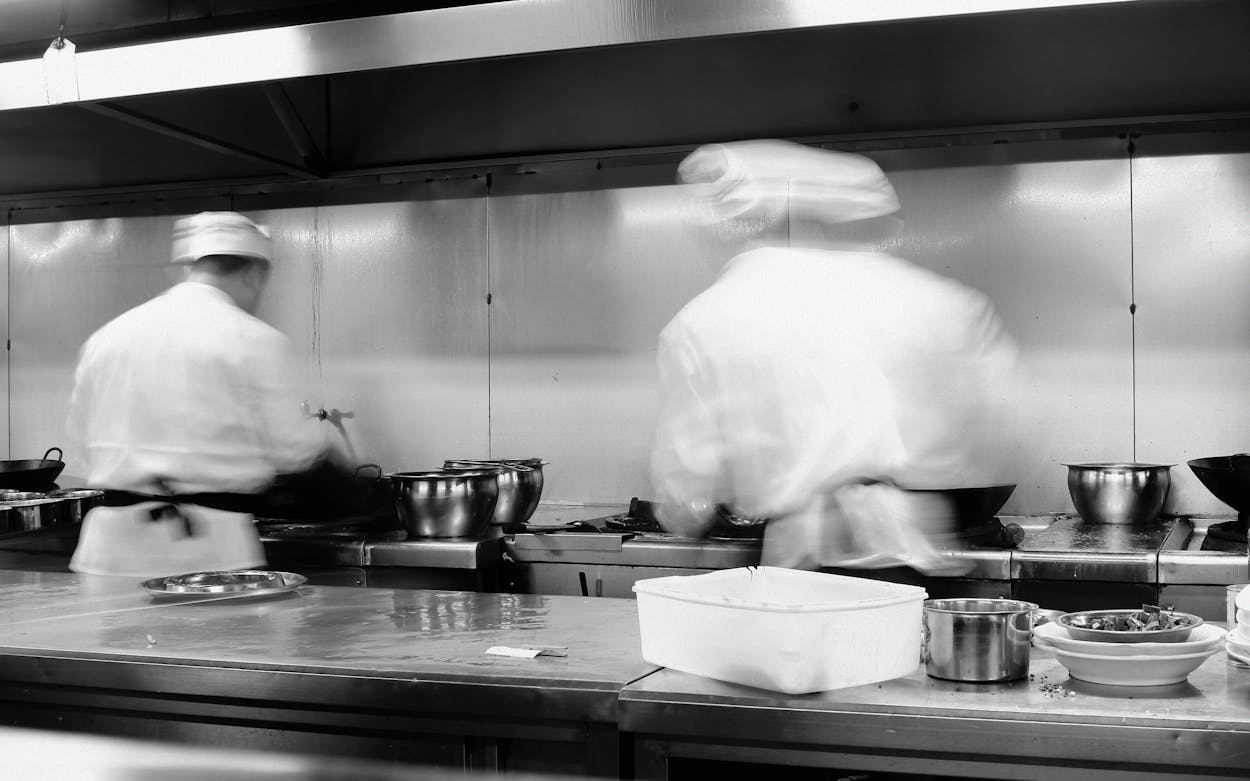Growing up in a Muslim community, I knew many people who would fast during Ramadan, a month-long religious observance where participants abstain from food and water from sunrise to sunset. My family wasn’t particularly religious, so I only fasted on occasion, but I admire people who fast—especially when they work in a strenuous, food-centric environment like a professional kitchen.
There’s no doubt that working with food while fasting can be a challenge, especially since it’s customary for cooks to continuously taste dishes to maintain quality standards. Aside from the nature of the job, it’s hard to be on your feet for half the day on an empty stomach. I asked a few Muslim chefs and restaurant owners in Texas about how they operate their businesses during Ramadan, manage their cravings, and break the fast at the end of the day.
Even though I only dabbled in fasting, I very much took part in iftar, the meal to break the fast at sundown. But there is another meal Muslims have before sunrise called suhoor. While options abound for dining in the early evening, finding somewhere to eat at the crack of dawn is a different story. Some restaurants took the opportunity to fill the void and serve the community.
Abbas Dhanani, owner of Burger Bodega in Houston, opened up his restaurant early for a pop-up suhoor last year. Though he serves halal meat, his clientele isn’t exclusively Muslim. Dhanani recalled a predawn line packed with “hijabs and blunts,” a testament to the variety of Houstonians who might be craving a burger in the wee hours.
Like Burger Bodega, Q’s Deli, in Sugar Land, opened in the middle of the night for a suhoor pop-up event this year. According to owner Ali Qureshi, two thousand people showed up between 10 p.m. and 4 a.m., most likely for his reuben samosa special, a take on the South Asian savory pastry with a filling of pastrami, Swiss cheese, and sauerkraut, with a side of Russian dressing. Qureshi also confided in me about some of his cravings while fasting—particularly sugar. “For the last three days I’ve had this craving for a huge slice of death by chocolate cake with a tall glass of milk,” he said. But he gets through it by remembering those who go hungry year-round. “I remind myself how lucky I am to have what I want when I want it,” he said. “We are blessed.”
Madiha Chughtai, owner of M’s Bakes and Cakes in Richmond, about thirty miles southwest of Houston, gets a serious hankering for caffeine. “As soon as I break my fast, I have a tea in my hand.” she told me. Even without tea, Chughtai said, it’s not that hard to work while fasting. “Honestly, I love to bake, especially when I’m doing something creative like decorating cakes with fondant,” she said. “It’s just not a burden.”
Ramadan can be a time that brings observers closer to family. Redwan Huda, who grew up in Bangladesh and now infuses the flavors of his native country at SauceBros, a pizzeria in Plano, began practicing Ramadan when he moved to the U.S. in 2009 to connect with his culture. “During Ramadan there is a spiritual mindset,” Huda said. “You’re having this family meal on a daily basis that doesn’t happen when it’s not Ramadan. You see friends and family more often.”
Coworkers can become family too, especially in the close-knit surroundings of a restaurant. When Cherif Mbodji, the director of operations at Bludorn Restaurant in Houston, started working in fine dining in New York City, Ramadan allowed him to bond with some of his coworkers. “In New York City, you will find that the biggest workforce in the restaurant business are Mexican and Bengalis,” Mbodji said. “Every Bengali guy would bring food for iftar, and when it was time to break fast, we would take turns by groups of two and three and share food our families made—it was something just incredible.” Now he continues that tradition by coordinating meal breaks for those on his staff who observe Ramadan.


But in the middle of the day, how do cooks and chefs taste the food coming out of the kitchen to ensure it’s up to snuff? Ahmed Siyaji of Halal Fusionz, a Pakistani and Tex-Mex ghost kitchen in Farmers Branch (outside of Dallas), has a work-around. “You can’t eat the food you taste but you can spit it out and rinse your mouth out,” he explained.
Unfortunately, that method doesn’t work for Zain Shafi of Sabar BBQ, in Fort Worth. He decided instead to close his restaurant for the month. “There was a lot of talk back and forth of should we close or stay open,” Shafi said of discussing the solution with his three-person staff. “Ultimately it is a privilege to do what I do, and I can give up one month out of the year.” Luckily, the decision carried less of a financial blow, as all of Sabar’s employees have secondary jobs. I, for one, am anxiously waiting for Eid al-Fitr, the end of Ramadan, to dig into Shafi’s Pakistani-influenced barbecue.
- More About:
- Fort Worth
- Houston
- Plano
- Sugar Land






